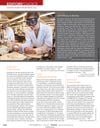7 citations,
September 2013 in “Tissue engineering. Part A” Hair follicle stem cells can become motor neurons and reduce muscle loss after nerve injury.
56 citations,
November 2007 in “Molecular and cellular endocrinology” Two enzymes regulate androgen receptor activity, affecting treatments for androgen insufficiency and benign prostatic hyperplasia.
January 2024 in “Medicina” Statins may help treat PCOS by lowering androgen levels and improving cholesterol.
 77 citations,
March 2021 in “Nature”
77 citations,
March 2021 in “Nature” Stress hormone corticosterone blocks a growth factor to slow down hair stem cell activity and hair growth.
September 2021 in “Yearbook of pediatric endocrinology” Stress hormone stops a growth signal and keeps hair stem cells inactive, reducing hair growth.
 November 2023 in “Hair transplant forum international”
November 2023 in “Hair transplant forum international” Caffeine can stimulate hair growth, but the best dose and frequency for hair loss treatment are still unknown.
 122 citations,
November 1998 in “Archives of Dermatology”
122 citations,
November 1998 in “Archives of Dermatology” Aromatherapy with certain essential oils is a safe and effective treatment for hair growth in alopecia areata patients.
 24 citations,
May 2013 in “Drug Design Development and Therapy”
24 citations,
May 2013 in “Drug Design Development and Therapy” Multimodal minoxidil microemulsion is more effective in treating hair loss than minoxidil alone.
 19 citations,
February 2015 in “Contact dermatitis”
19 citations,
February 2015 in “Contact dermatitis” Avoiding certain fragrances improved the man's skin condition.
 2 citations,
January 1979 in “Yearbook of English studies”
2 citations,
January 1979 in “Yearbook of English studies” Nineteenth-century British drama closely reflected the era's societal values and concerns.
 June 2023 in “International journal of research in Ayurveda and pharmacy”
June 2023 in “International journal of research in Ayurveda and pharmacy” Malatyadi tailam effectively improved hair fall, dryness, and thinness in a patient.
 November 2021 in “International journal of life science and pharma research”
November 2021 in “International journal of life science and pharma research” The new gel for psoriasis is effective, stable, and easy to apply.
 September 2013 in “Science”
September 2013 in “Science” Certain astrocytes can protect the brain and improve recovery after a stroke, and a hair loss drug might reduce cancer spread.
 September 2013 in “Science”
September 2013 in “Science” Transplanted human Olig2+ astroglia may help improve learning and memory after a stroke.
 September 2013 in “Science”
September 2013 in “Science” Human stem cells can aid stroke recovery, research experiences boost students' career aspirations, minoxidil may reduce cancer spread, a molecule can slow tumor growth, a protein affects water flow in cells, magnesium behaves differently at tiny scales, and a new method detects slow-moving objects.
 September 2013 in “Science”
September 2013 in “Science” Undergraduate research experiences boost students' research skills, confidence, and career aspirations.
 September 2013 in “Science”
September 2013 in “Science” Special astrocytes improved learning and memory in rats after a stroke.
 September 2013 in “Science”
September 2013 in “Science” Special astroglia cells improved stroke recovery in rats, a hair growth drug reduced cancer spread, and tiny magnesium structures were more easily shaped.
 September 2013 in “Science”
September 2013 in “Science” The document concludes that human astrocytes aid stroke recovery, research confidence affects student career aspirations, collagen affects cancer spread, a microRNA suppresses brain cancer growth, calmodulin regulates water channels, and small magnesium pieces deform differently.
 474 citations,
January 2012 in “Chemistry & biology”
474 citations,
January 2012 in “Chemistry & biology” Proteasome inhibitors are promising treatments for various cancers, autoimmune diseases, and other conditions.
 284 citations,
February 2008 in “Pediatrics”
284 citations,
February 2008 in “Pediatrics” Chemicals and body size might change when puberty starts and progresses, but more research is needed to confirm this.
 238 citations,
July 2003 in “British Journal of Plastic Surgery”
238 citations,
July 2003 in “British Journal of Plastic Surgery” Hidradenitis suppurativa, a chronic skin disease, can be managed with antibiotics, lifestyle changes, and in severe cases, surgery. Early diagnosis and careful planning are key, and laser treatment can be an efficient solution for mild to severe cases.
 218 citations,
December 2011 in “Advances in Urology”
218 citations,
December 2011 in “Advances in Urology” The document concludes that the 5 alpha-reductase enzymes are important in steroid metabolism and related to various human diseases, with inhibitors used to treat conditions like male pattern baldness and prostate issues.
 207 citations,
April 2006 in “Journal of The American Academy of Dermatology”
207 citations,
April 2006 in “Journal of The American Academy of Dermatology” Iron deficiency may be related to hair loss, but there's not enough evidence to recommend iron screening or supplements for all hair loss patients.
 195 citations,
January 2008 in “Photochemistry and Photobiology”
195 citations,
January 2008 in “Photochemistry and Photobiology” Visible light can damage skin and most sunscreens don't block it well; more research is needed on its effects and protection methods.
 99 citations,
June 2005 in “Journal of Cosmetic Dermatology”
99 citations,
June 2005 in “Journal of Cosmetic Dermatology” Hair ages due to genetics and environmental factors, leading to graying and thinning, with treatments available for some conditions.
 98 citations,
October 2012 in “Dermatologic Clinics”
98 citations,
October 2012 in “Dermatologic Clinics” Eating the right nutrients can improve hair health, but taking extra supplements usually doesn't help unless you have a deficiency.
 81 citations,
January 2011 in “European Journal of Internal Medicine”
81 citations,
January 2011 in “European Journal of Internal Medicine” Despite progress, better treatments and understanding are needed for the high rates of long-term issues and deaths linked to eating disorders.
 70 citations,
June 2010 in “Clinics in Dermatology”
70 citations,
June 2010 in “Clinics in Dermatology” Certain groups may need vitamin supplements to improve hair health and prevent other health problems.
 69 citations,
August 2008 in “Journal of The European Academy of Dermatology and Venereology”
69 citations,
August 2008 in “Journal of The European Academy of Dermatology and Venereology” Oral dutasteride and topical pimecrolimus can safely and effectively treat Frontal Fibrosing Alopecia, leading to significant hair regrowth.

























